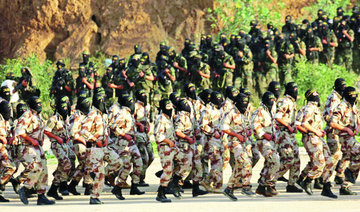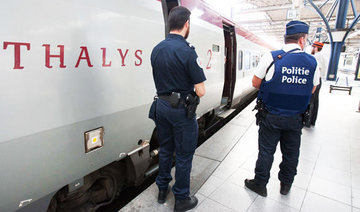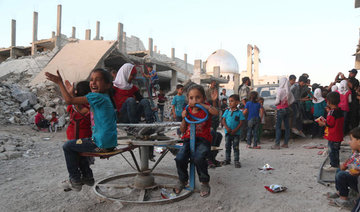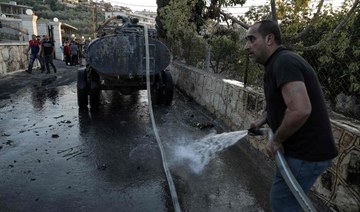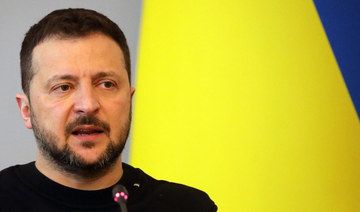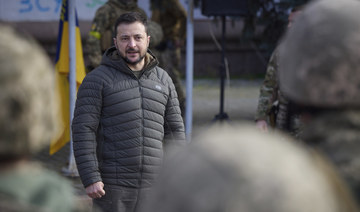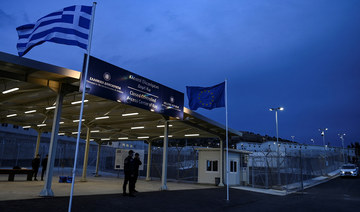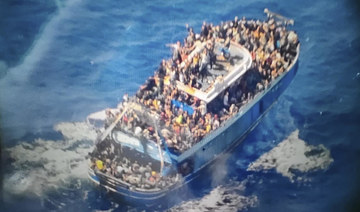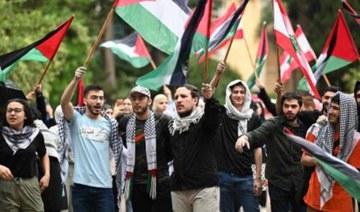LONDON: Terror experts have highlighted the mounting threat posed by low-profile Islamic extremists following a series of attacks across Europe.
Policy makers are increasingly focused on identifying the danger from periphery plotters in an effort to detect hitherto off-the-radar radicals at risk of being drawn deeper into the terrorist activity.
“As Daesh is being slowly taken apart, it will be vital to ensure that those who may previously have kept away from the fray will not now be drawn into it,” said Professor Anthony Glees, director of the Center for Security and Intelligence Studies (BUCSIS) at The University of Buckingham.
With the disintegration of Daesh’s self-proclaimed caliphate in Syria and Iraq, commentators have warned of an evolving threat across Europe as individuals, who might previously have tried to travel to Syria, look to carry out attacks at home.
“The threat picture has moved in such a way that people considered to be peripheral before are becoming center of the plot,” said Rafaello Pantucci, the director for International Security Studies at the Royal United Services Institute for Defense and Security Studies.
“If you look at the plotting we’ve seen across Europe, there have been far fewer large-scale actors planning complicated operations and much more of these low-level attacks.”
Policy makers, he said, are adapting their response to match the shifting threat from “these random isolated individuals launching this sort of lower-level attack across the continent.”
“Everybody is facing a similar problem,” he continued, pointing to discussions in Germany around changing the laws on how authorities listen in on people, France’s plans to centralize and share intelligence and a spate of deportations in Italy as authorities expel more individuals suspected of having having terrorist ties.
In the UK, new sentencing guidelines have been drawn up to impose tougher punishment on terrorist plotters, targeting those with lower levels of involvement in response to the growing trend toward less sophisticated methods of attack.
Speaking to Arab News in the wake of a recent attack at London’s Parsons Green station, where a home-made bucket bomb was detonated on a District Line tube injuring 30 people, Dr. Abdullah Khaled Al-Saud, a Visiting Fellow at ICSR, King’s College London said: “It has become increasingly difficult for security forces to defend against every possible terrorist attack, especially given the fact that the pattern and nature of terrorist attacks have changed in recent years.”
“Groups have been encouraging their followers to avoid complex and highly coordinated operations, and focus instead on attacks that are very simple to carry out, the ones that would only require a kitchen knife or a rented car or truck.”
In a draft version of the guidelines, the Sentencing Council for England and Wales emphasised the danger of the current climate, “Where a terrorist act could be planned in a very short time using readily available items as weapons” and where “acts of terrorism can be committed by many rather than a few highly-organized individuals.”
Describing the move as a “proportionate response,” Fiyaz Mughal, director of Faith Matters, an organization supporting community integration in the UK, pointed to the “sheer number of plots that are taking place and people ending up supporting the cause.”
“The Daesh ideology has created quite a fanbase and the problem is going to be with us for at least a couple of years.”
“It is important to review the legislation regularly in response to rapidly changing political scenarios,” he said.
Pantucci described the difficulty of responding to a much more diffuse pattern and methodology of terrorism. “Legislation hasn’t kept up with the reality of the threat,” he said, adding that it’s increasingly hard to tell where this is coming from.
“Periphery players keep turning out to be the ones trying to launch an attack so it’s becoming very difficult to calibrate.”
Periphery attackers pose different kind of terror threat for Europe
Periphery attackers pose different kind of terror threat for Europe
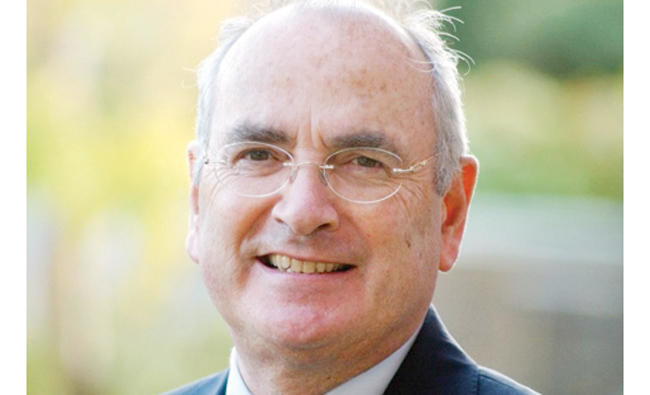
Poland says it is probing alleged links between Orlen unit’s ex-CEO and ‘terrorist organizations’
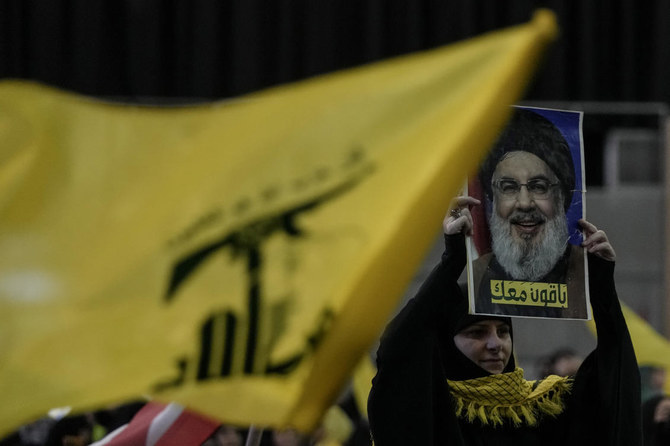
- Polish website Onet had reported on Monday that the former CEO of Orlen Trading Switzerland was suspected by Orlen’s internal security unit of having had contacts with Hezbollah
- The ex-CEO denied in an interview with Polish private radio RMF on Tuesday that he had any connections with Hezbollah
WARSAW: Poland has launched an investigation into multi-million-dollar cash losses by Polish refiner Orlen’s Swiss unit and allegations that its former CEO had ties to “terrorist organizations,” Warsaw chief prosecutor Malgorzata Adamajtys said on Tuesday.
Polish website Onet had reported on Monday that the former CEO of Orlen Trading Switzerland, referred to only as Samer A. due to local privacy laws, was suspected by Orlen’s internal security unit of having had contacts with Lebanon’s powerful Iran-backed Hezbollah militant group.
Samer A., the ex-CEO of Orlen’s Swiss subsidiary OTS, denied in an interview with Polish private radio RMF on Tuesday that he had any connections with Hezbollah.
“I have been to Poland many times, I am a Polish citizen, I have a Polish passport. I am treated by the current authorities as a second-class citizen,” he said, adding that though he was currently abroad, he was not hiding from Polish law enforcement.
Asked at a press conference for details of the investigation, chief prosecutor Adamajtys said: “We are looking into all information, some of which is known to prosecutors from the press, radio and television, including on connections with terrorist organizations.”
Western countries including the US designate Hezbollah as a terrorist organization. The European Union classifies Hezbollah’s military wing as a terrorist group, but not its political wing.
Adamajtys said OTS was established as a business despite a warning by Orlen’s internal security unit not to do so. It operated, according to Adamajtys, without proper supervision, documentation and verification of contractors. She said this showed that Samer A. should not have been appointed as CEO.
“A person who makes advance payments without completion of the first tranches of certain deliveries is not a good CEO and should not be the CEO of this or any other company,” she said.
Reuters sought to contact Samer A. for comment on Adamajtys’ remarks about OTS operations, but he could not be reached. In his conversation with RMF, he denied that there had been any warning from Orlen’s internal security unit.
OTS LOSSES
Orlen has said OTS was behind the loss of around $400 million linked to contracts to buy Venezuelan oil and oil products.
OTS has said it tried to benefit from a temporary window in US sanctions against Venezuela and paid cash advances to intermediaries it never worked with before. The contracts were canceled, it said, as a closure of the window was nearing, and tankers weren’t loading.
Orlen has said it is currently auditing OTS operations.
Adamajtys said Orlen also faced questions over the alleged manipulation of fuel prices to artificially low levels ahead of last year’s national election and a sale of some assets that investigators suspect were below market level.
In February, Orlen rejected an allegation of below-market asset sales from the state audit office, saying it gained as much as 9 billion zloty ($2.2 billion) in one corporate merger. The company also denied lowering fuel prices artificially.
Samer A. has been charged in a separate probe with VAT fraud between 2008-2013, a regional prosecutor in Bydgoszcz said on Monday. He was detained by police and questioned by a prosecutor in February, and released on bail, the prosecutor added.
Opposition critics said that under the previous, nationalist Law and Justice (PiS) government, which lost power in that vote, Orlen had helped financed the party’s policy agenda, including taking control of some media outlets.
On Monday, Prime Minister Donald Tusk said he had called the country’s chief prosecutor and secret services coordinator to discuss potential links between the former CEO of Orlen, Daniel Obajtek, and Hezbollah.
Obajtek, a close associate of PiS leader Jaroslaw Kaczynski, responded on social media platform X that Tusk was “looking for scandals where there are none.”
Polish media have reported that PiS might put up Obajtek as a candidate in June’s European Parliament election.
Forest fires raze parts of India amid heat, dry weather
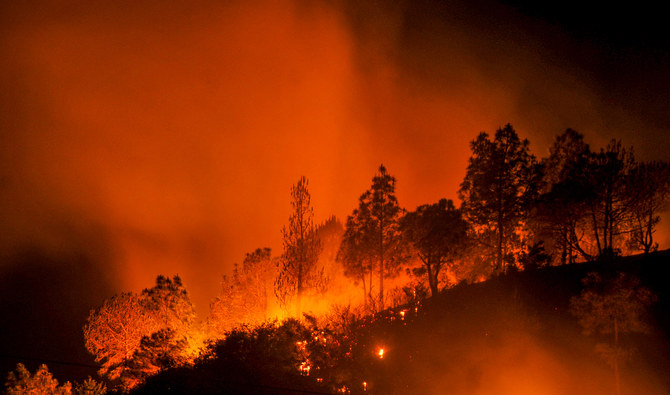
- As of 2021, 54.4 percent of forests in India experienced occasional fires, most of them due to man-made factors
- These fires have picked up again this year, with 653 incidents in Uttarakhand alone, government data shows
NEW DELHI: Frequent fires are razing forests in India’s Uttarakhand state in the north and Odisha in the east amid high temperatures and long dry spells, and the blazes have been worsened by people burning the forest to collect a flower used to brew alcohol.
Data from the state-run Forest Survey of India shows that as of 2021, 54.4 percent of forests in India experienced occasional fires, most of them due to man-made factors.
“Agriculture stubble burning, misconceptions and burning of shrubs to shoo away wildlife are major reasons behind the forest fires,” Swapnil Aniruddh, a forest official in Uttarakhand, told Reuters.
After a brief respite during the previous season from November to April, forest fires have picked up again this year, with 653 incidents in Uttarakhand alone, government data shows.
Odisha’s fires have been exacerbated by people setting parts of the forest ablaze to collect Mahua flowers, which are highly sought after as they are used to brew a popular liquor.
During the current season, 10,163 fire points in Uttarakhand have been detected using the government’s imaging radiometer.
Overall, loss of significant forest cover is a big worry for India as it tries to dramatically reduce its climate-changing emissions.
Among the organizations helping to curb the fires is the Indian Air Force, which has used the aerial firefighting ‘Bambi Bucket’ technique of collecting water from a nearby lake to spray over the region.
The situation may get worse, with India’s weather department predicting more heat-wave days than normal between April and June this year, along with a longer dry spell for Uttarakhand.
Pentagon chief pushes for donation of more Patriot systems to Kyiv
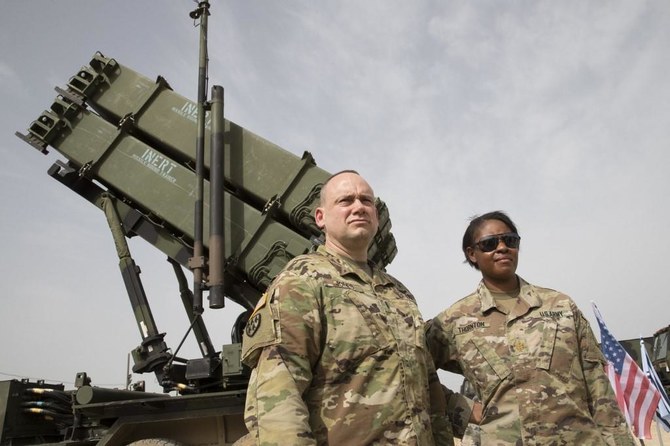
- “There are countries that have Patriots, and so what we’re doing is continuing to engage those countries,” Austin told a House Armed Services Committee hearing
WASHINGTON: US Defense Secretary Lloyd Austin said Tuesday he has been encouraging countries with Patriot missile systems to donate them to Ukraine, which has appealed for more of the air defense batteries.
“There are countries that have Patriots, and so what we’re doing is continuing to engage those countries,” Austin told a House Armed Services Committee hearing.
“I have talked to the leaders of several countries... myself here in the last two weeks, encouraging them to give up more capability or provide more capability,” he said, without identifying the countries by name.
Various European Union countries possess the systems, including Spain, Greece, Germany, the Netherlands, Poland and Sweden.
Ukrainian President Volodymyr Zelensky told NATO members earlier this month that his country needed a minimum of seven additional Patriot or other high-end air defense systems to counter Russian air strikes, urging them to step up their military assistance for Kyiv.
Greek court drops criminal charges against 35 international aid workers
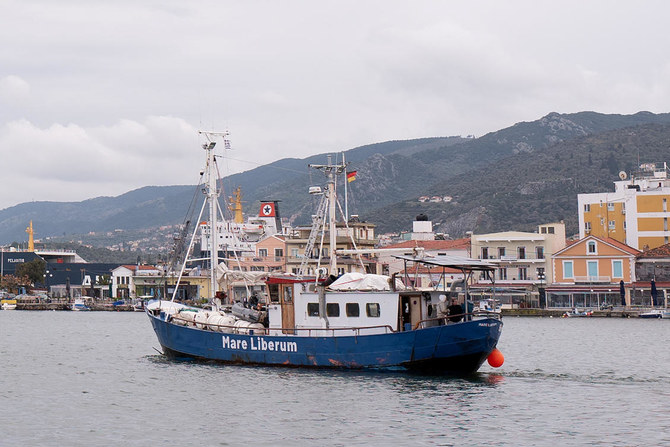
- The case was dropped due to inadequate evidence
- Greece was on the front line of a huge surge of refugees and migrants to Europe in 2015 and 2016
ATHENS: Greece has dropped criminal charges against dozens of international aid workers, ranging from spying to facilitating what authorities had called illegal entry into the country through the island of Lesbos, court documents showed on Tuesday.
Most of the 35 people, accused in 2020 of setting up a criminal organization and providing support to traffickers ferrying migrants, were German nationals. The rest included people from Norway, Austria, France, Spain, Switzerland and Bulgaria. They were arrested and had denied wrongdoing at the time.
The case was dropped due to inadequate evidence, the documents seen by Reuters showed.
“The detailed investigation of the case file has resoundingly quashed the police narrative which was pure fiction,” said Zaharias Kesses, a lawyer representing some of the aid workers.
Greece was on the front line of a huge surge of refugees and migrants to Europe in 2015 and 2016, many through its outlying islands close to Turkiye, including Lesbos. That flow has since ebbed.
The case was based on a 2020 operation by the Greek intelligence service EYP and the anti-terrorism unit with the code name Alkmini, and involved undercover agents who traveled as migrants from Turkiye to Lesbos.
Greek intelligence services were initially involved because the workers, who were using an alarm phone for migrants and asylum seekers in need of rescue at sea, were thought to have passed on information on Greek coast guard movements and vessel equipment.
But a magistrate’s investigation concluded the information and visual material collected were not confidential.
“There is not enough evidence to support the accusations against the defendants,” the documents said.
Top French university loses funding over pro-Palestinian protests
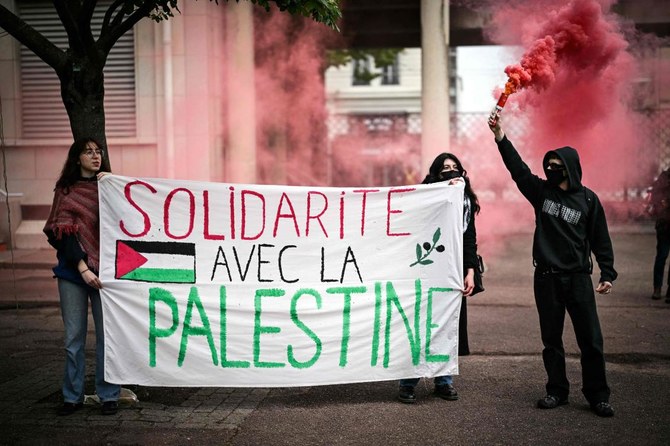
- Regional support for the Paris-based university includes 1 million euros earmarked for 2024
- The university’s acting administrator, Jean Basseres, said he regretted the decision
PARIS: The Paris region authority sparked controversy Tuesday by temporarily suspending funding for Sciences Po, one of the country’s most prestigious universities, after it was rocked by tense pro-Palestinian demonstrations.
“I have decided to suspend all regional funding for Sciences Po until calm and security have been restored at the school,” Valerie Pecresse, the right-wing head of the greater Paris Ile-de-France region, said on social media on Monday.
She took aim at “a minority of radicalized people calling for anti-Semitic hatred” and accused hard-left politicians of seeking to exploit the tensions.
Regional support for the Paris-based university includes 1 million euros earmarked for 2024, a member of Pecresse’s team told AFP.
On Tuesday, the university’s acting administrator, Jean Basseres, said he regretted the decision.
“The Ile-de-France region is an essential partner of Sciences Po, and I wish to maintain dialogue on the position expressed by Mrs.Pecresse,” he told French daily Le Monde in an interview published Tuesday.
In an echo of tense demonstrations rocking many top US universities, students at Sciences Po have staged a number of protests, with some students furious over the Israel-Hamas war and ensuing humanitarian crisis in the besieged Palestinian territory of Gaza.
France is home to the world’s largest Jewish population after Israel and the United States, as well as Europe’s biggest Muslim community.
University officials called in police to clear a protest last week. On Monday, police broke up a student protest demanding an end to Israel’s bombardment of Gaza at Sorbonne, another top French university.
Higher Education Minister Sylvie Retailleau said on Tuesday the French government had no plans to suspend funding for Sciences Po.
Speaking to broadcaster France 2, she estimated the state’s funding for the university at 75 million euros. She said there had been “no anti-Semitic remarks” and no violence had been committed during the demonstrations.
Both Basseres and Retailleau also said there were no plans to suspend Sciences Po’s collaboration with universities in Israel.
Critics on the left have denounced Pecresse’s announcement.
“It’s shameful and an absolute scandal,” said Mathilde Panot, the head of hard-left France Unbowed (LFI) deputies in parliament, adding the behavior of the students was a “credit to the world and a credit to our country.”
Panot and Rima Hassan, a Franco-Palestinian activist who is running on the LFI list for European elections, were on Tuesday questioned in an investigation into suspected justification of “terrorism” over comments on the October 7 attack by Hamas on Israel.
Several hundred people staged a solidarity rally in support of the two women on Tuesday morning.
“In what democracy are counter-terrorism methods used against political activists, community activists and trade unionists?” Panot, 35, told her supporters, who chanted “Resistance” and waved Palestinian flags.
“I want to tell the pro-Israeli lobby organizations behind these complaints that they will not silence us,” added 32-year-old Hassan.
The war started after Hamas’s October 7 attack on southern Israel resulted in the deaths of 1,170 people, mostly civilians, according to an AFP tally of Israeli official figures.
Israel’s retaliatory offensive has killed at least 34,535 people in Gaza, mostly women and children, according to the health ministry in the Hamas-run territory.
Palestinian militants also took some 250 hostages on October 7. Israel estimates 129 remain in Gaza, including 34 believed to be dead.


